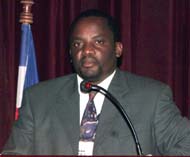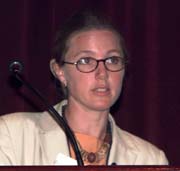 |
San José, Costa Rica 10-18 May 1999 |
|
Briefing |
|
Delegates at COP7
participated in Technical Sessions on Tools for Assessing and Recognizing
Wetland Values in the morning and on the Framework for Regional and International
Cooperation Regarding Wetlands in the afternoon. A contact group also
met to conduct informal consultations on the status of Yugoslavia in the
Convention. |
|
|
| Andrea Bagri, IUCN Economic Services Unit, made a presentation on Ramsar and Impact Assessment. She said impact assessments have been identified as key tools for assisting countries in implementing various conventions, including Ramsar and those on biodiversity, migratory species, and desertification. Noting that impact assessment processes provide an opportunity to bring local and indigenous communities into decision making, she said CPs should seek to strengthen participatory procedures. | |
| Max Finlayson, Environmental Research Institute of the Supervising Scientist, discussed the Wetland Risk Assessment Framework. He said indicators should be anticipatory, predictive, sensitive, cost-effective, diagnostic, socially relevant, non-destructive, and applied in a timely manner. | |
 |
|
| Maureen Ballestero, International Network of Basin Organizations, spoke on international cooperation through river basin commissions. She highlighted gaps that need to be filled in the international legal framework on shared water resources. | |
|
Javier
Beltran, World Conservation Monitoring Centre, presented the preliminary
findings of a GIS analysis on the world’s shared wetlands and river basins.
He highlighted areas requiring further work, including: analysis of the
levels of risks in vulnerable sites; assessment of the extent of wetlands
designated as protected areas; prioritization of coastal marine wetland
habitats; and assessment of the management regimes of cross-border sites.
|
 |
|
|
|
| Suzanne
Palminteri, Biodiversity Conservation Specialist, discussed how user-friendly
geographic information systems (GIS) can assist wetland site-level managers
to assimilate and interpret data for addressing management questions. She
noted that, in contrast to costly and complicated high-end GIS technology,
site-level GIS is available for less than US$1000, simple to teach and learn,
and valuable for spatial management of wetlands and associated biodiversity |
|
|
Stevie
Monna, Botswana National Conservation Strategy Agency, discussed the framework
for international cooperation to manage the Okavango River, shared by
Angola, Botswana and Namibia. He said Botswana is collaborating with the
Ramsar Bureau to develop a delta management plan that can be integrated
into a plan for the entire Okavango Basin.
|
 |
| Cheah Kong Wai, SC Representative for Asia, presented guidelines for international cooperation under the Convention. He noted a growing recognition of the value of multi-State river basin management commissions, and said the guidelines seek to foster such commissions to facilitate cooperation. | |
|
Faizal
Parish, Global Environment Centre, outlined the results of a project to
examine existing donor arrangements for wetland conservation and wise
use. The project highlights a major decrease in bilateral funding since
1992, an increase in multilateral support to wetlands, an increase in
the number of environmental projects, and the integration of environmental
considerations into donors’ sectoral strategies.
|
 |
Back to ENB's Ramsar COP7 home page
© Earth Negotiations Bulletin, 1999. All rights reserved.





